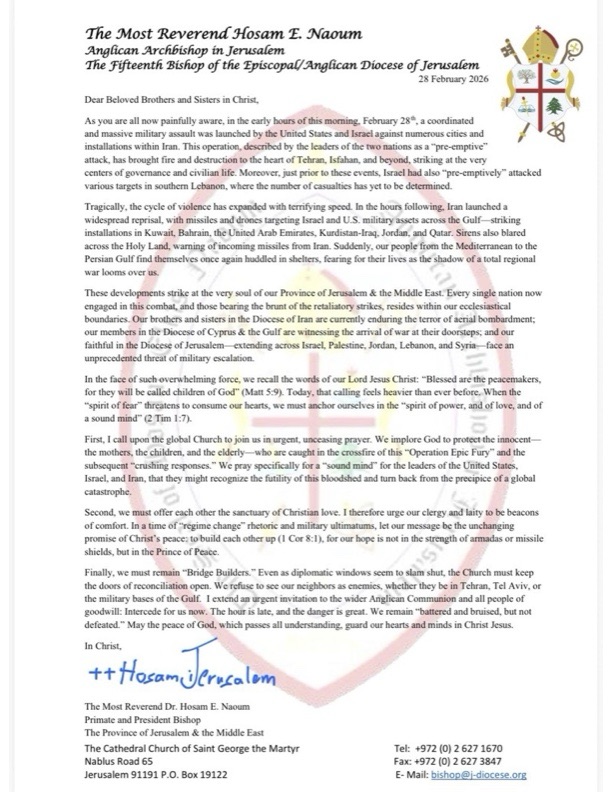Isaiah 42:1-9, Matthew 3:13-17
Jesus’ ministry is bookmarked by humility. From his humble birth and early childhood as a child of refugees, seeking asylum in a foreign land. And here, coming to John for baptism, the Lord of all has no need to lord it over anyone. There is no pomp, pride, parading. The only display of power is that of the Holy Spirit, descending upon him like a dove, and the voice from heaven falling down like thunder: this is my Son, the Beloved, with whom I am well pleased.
And when we ask what it is that has pleased God so much, it is clear that God delights simply in Jesus’ very existence: God’s Son. God’s Beloved. Nothing has yet happened by way of miracle or sacrifice. Only Jesus, coming to the water to meet his maker. That is how God’s love is: not earned, not commanded, not pretended to, but wrapped up in our very existence, ordained by God,
who created the heavens and stretched them out,
who spread out the earth and what comes from it,
who gives breath to the people upon it
and spirit to those who walk in it.
Many, many years ago, I visited Galilee, and I nearly drowned in its rivers, except that of course I didn’t; but only because others pulled me to safety.
When Jesus was baptized, in that river, if he fell beneath the running waters, twisted by its currents and submerged by its strong steam, the Word silenced by the Flood; then the waters of chaos witnessed once more the Spirit of God brooding over them like a bird; then the Spirit sought out Jesus like a dove, so that the moment he broke through the surface, gasped a breath, it was there to breathe new life into his lungs, the new creation.
And John was there, too, because one of the gifts of the incarnation, the coming of God among us as one of us, Jesus, is the knowledge that none of us does any of this alone. Righteousness, struggling to breathe, glorifying God from the heavens; none of it is a solo but a community chorus. No one baptizes themselves, not even Jesus.
A few years ago, I went back and I visited Jordan, and the region where John was said to have baptized Jesus. It’s in what is known as the demilitarized zone, a tense strip of truce between neighbours. The border runs through the river, dividing pilgrims renewing their baptismal promises on one side or the other.
But the pilgrims are remembering their baptism, in which they promised to resist all powers that would separate them from the love of God for them and for one another, and to follow in the footsteps of Jesus, who made no distinction between himself and his cousin. And so the pilgrims sing to one another. They know that running water knows no borders, and that the Spirit of God makes no distinction between them, beloved children of God every one. For this is the new creation, in which such artificial divisions have not even been imagined.
God gives us our part in the dispensation of grace: what a gift! And we have done nothing to earn it. John asks Jesus, should I baptize you? And the answer is yes: our witness that Gods invites us to share in the mystery of the new creation, in the sacraments, gives us our part in the dispensation of grace. Jesus tells John: the grace that God has given you to administer, pour out freely and share with abandon. It is the right thing to do.
We know, we have heard of the love of God that is without exception. We know, and we have heard of the Son of God who is all humility and whose superpower is love. We are called to share that good news with whoever will listen, and with those who will not listen, but who may one day hear the voice of God falling like thunder, “my Beloved.”
We don’t need anything to do it, except the knowledge that God loves us. We don’t need great power. We don’t need to win any arguments, we don’t need the trappings of the world. Only the knowledge of the love of God, falling from the heavens like a dove, like dew, like rain upon the river, and a community of faith to remind us of it.
We live in a world and a country and a time that needs so badly to hear the good news, – from the holy lands to Venezuela, to Minneapolis to here, for all lands are holy and all people in them beloved – that Jesus, the Lord of all, isn’t interested in lording it over anyone, but only in the free-flowing, everliving mercy and love of God. For even
a bruised reed he will not break,
and a dimly burning wick he will not quench;
he will faithfully bring forth justice.
And, thanks be to God, we have been offered our part in that mercy, that love, that justice – not because we are powerful, nor because we are proud, but because God delights in us, delights in you, God’s own beloved, baptized with the same running water as Jesus, and filled with the Holy Spirit and with fire.


